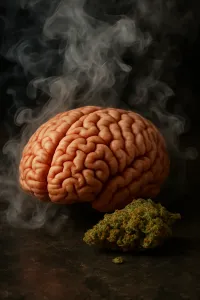Does Weed Make You Dumb? Exploring the Science and Myths
The question of whether cannabis, often called weed, makes you "dumb" is a common concern, especially as its use becomes more mainstream. Many people worry that smoking or consuming cannabis could harm their intelligence, memory, or cognitive abilities. This fear often stems from stereotypes, media portrayals, or outdated stigmas about stoners being unmotivated or forgetful. But what does the science actually say? Let’s break down the facts, dispel myths, and provide a clear, balanced look at how cannabis affects the brain.

Understanding Cannabis and the Brain
Cannabis contains compounds called cannabinoids, primarily THC (tetrahydrocannabinol), which is responsible for the "high," and CBD (cannabidiol), which is non-psychoactive and often linked to relaxation. These compounds interact with the body’s endocannabinoid system, which regulates functions like memory, mood, and focus. When you use cannabis, THC binds to receptors in the brain, particularly in areas like the hippocampus and prefrontal cortex, which are involved in memory and decision-making. This interaction is why some people experience short-term effects like forgetfulness or difficulty concentrating while high.
Short-Term Cognitive Effects
When you use cannabis, especially in high doses, it can temporarily affect cognitive functions. Common short-term effects include:
Impaired Short-Term Memory:
You might struggle to recall details or retain new information while under the influence. For example, you may forget what you were saying mid-conversation.
Reduced Focus and Reaction Time:
Cannabis can slow reaction times and make it harder to concentrate on complex tasks, like solving math problems or driving.
Altered Decision-Making:
The high can affect judgment, leading to impulsive or less calculated decisions.
These effects are temporary and typically wear off within a few hours as THC leaves your system. They don’t necessarily mean cannabis is "making you dumb," but rather that it alters brain function while active. Importantly, these effects vary widely based on the strain, dosage, and individual tolerance.
Does Cannabis Cause Long-Term Cognitive Decline?
The bigger question is whether regular cannabis use leads to permanent cognitive damage. Research on this topic is mixed, and the answer depends on several factors, including age, frequency of use, and individual differences.
Adolescents and Developing Brains
The most consistent evidence suggests that heavy cannabis use during adolescence, when the brain is still developing (up to around age 25), can have lasting effects. Studies show that frequent use in teens is linked to:
Slight declines in IQ, with some studies reporting a drop of 2-8 points in heavy users.Poorer performance in memory and attention tasks over time.Changes in brain structure, particularly in areas related to learning and memory.
However, these effects are not universal and are more likely with heavy, daily use starting at a young age. Casual or moderate use in adulthood shows less consistent evidence of long-term harm.
Adult Users
For adults whose brains are fully developed, the evidence is less clear. Some studies find no significant long-term cognitive decline in moderate users, while others suggest heavy, chronic use (daily or near-daily) may lead to subtle deficits in memory or processing speed. These effects are often small and may not be noticeable in everyday life. Importantly, many studies show that cognitive function can improve after a period of abstinence, suggesting that any deficits are not necessarily permanent.
Protective Effects of CBD
Interestingly, CBD, a non-psychoactive compound in cannabis, may counteract some of THC’s cognitive effects. Strains high in CBD are less likely to impair memory and may even support brain health by reducing inflammation and anxiety. This is one reason why balanced THC-CBD products are gaining popularity for those seeking wellness benefits without cognitive fog.
Myths vs. Reality
Myth: Cannabis Kills Brain Cells
The idea that weed "kills brain cells" comes from early studies that were later debunked. Current research shows that cannabis does not cause widespread brain cell death. Instead, it temporarily alters how neurons communicate, which can affect memory and focus while high.
Myth: All Users Become Unmotivated
The "lazy stoner" stereotype suggests cannabis saps ambition. While some users experience reduced motivation (sometimes called "amotivational syndrome"), this is not universal and may be more tied to individual personality, lifestyle, or heavy use. Many successful professionals, artists, and athletes use cannabis and remain highly productive.
Reality: Dosage and Moderation Matter
The effects of cannabis depend heavily on how much and how often you use it. Occasional, moderate use is less likely to cause cognitive issues than heavy, daily use. Choosing lower-THC strains or products with CBD can also minimize unwanted effects.
Factors That Influence Cognitive Impact
Frequency and Dosage:
Heavy, frequent use increases the risk of cognitive effects compared to occasional use.
Method of Consumption:
Smoking or vaping delivers THC quickly, potentially causing stronger short-term effects, while edibles produce a slower, longer-lasting high that may feel more intense.
Age of First Use:
Starting cannabis use before the brain is fully developed (around age 25) increases the risk of long-term effects.
Individual Differences:
Genetics, mental health conditions, and lifestyle (like sleep and diet) can influence how cannabis affects your brain.
